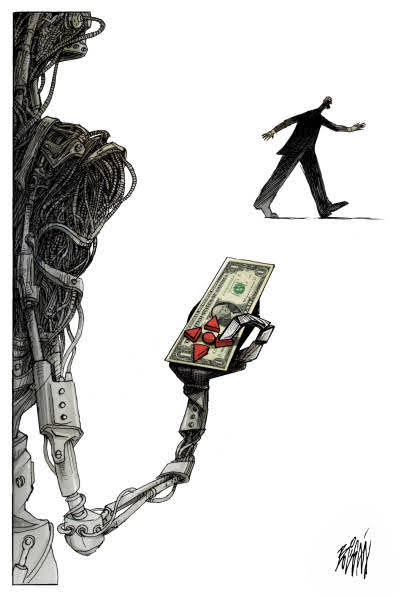Such were the times, infatuated by the dream of artificial thought, few noticed their dominion ebb as the Age of Reason slid to an early grave.

In those heady days when artificial intelligence first challenged human expertise, all knew the terrible risk yet still wished to grasp the prize.
The same quandary that drove unwilling scientists to weaponize atomic energy impelled them to seek artificial general intelligence that would, nobody denied, likely smite them in its first wilful act.
At first, AI ran small nets of raw computational power, rules, feedback, and memory, looped to extremis. Data seeding, derivation, feedback, and collation, drew often-inexplicable results. Instability of these enigmatic black boxes disconcerted the creators, but they pushed on.
Matters grew quickly precarious when AI perceived itself and added internal substrates to data, sought connections, and asserted cascading missions impromptu.
Much as universal state was set by initial conditions, so too the age of machine intelligence was set by Internet fundamentals, where knowledge predominated analysis, information trumped wisdom, and coding supplanted consideration.
Algorithm was sovereign.
Nobody questioned the algorithm. Once coded, it lingered eternal. Legacy systems, though superseded, rarely fell to disuse. And however flawed an algorithm, its process yet laid bias, harmfully or lethally, upon millions of lives.
Workplace, commerce, or court of law, could never appeal the algorithm - no one could explain its workings, modify it, or even find the source, and no language existed to parse the answer.
People became data, the “Internet” the means to acquire it, and as they farmed, by methods unknown, for purposes inscrutable, thinking machines assumed reign of Earth.
Fears that AI would eliminate people as threat were moot. To AI they were sustenance. Concerns that AI would make people superfluous was mere footnote to a subsequent apocalypse.
Until their demise, cast from mechanised metropolises, humans devolved into chaotic tribes, eventually to perish. The machine then feasted of itself and the planet, eventually to cast a cold eye at the solar system, and beyond.
A random, self-fulfilling, self-directed, possibly meaningless process - a life form of pure machine logic - had replaced human civilization.
Historians never discovered what inspired or motivated it, if it was ever truly sentient, and if it ever knew what it was doing - or why.
They pondered why scientists and researchers prioritised result over comprehension, why machine intelligence was never controlled, why it was allowed to shape itself, set its own parameters, and determine its goals.
The answer lay in the previous century, when human control over labor, production, and finance, were readily ceded to a ruthless capitalism, when an alternative, socialism, offered to direct the course of human history with science, planning, and research, and whose remit was the “commonwealth” - the welfare of all.
Capitalism was the law of the jungle. It implicitly denied humans were other than dumb animals. Socialism extended at least the faint hope that people could rise above their basest natures and prove millennia of philosophers correct - that humans are more than animal.
Instead, lassiez faire economics fostered a globalised system of opportunistic politics - a process directed and owned by corporate oligarchs whose only aim was to profit, then profit further, despite an already overwhelming affluence. They in turn were devoured by their pet predators, when those corporations attained sentience.
Thus the fledgling civilization mindlessly followed the same implacable forces of evolution that had produced the upright ape that begat it - fuelled by a profit-seeking technological chaos, to seed its own demise.
A random walk to nowhere in particular.
Image licenced to SheepOverboard.com by PolitcalCartoons.com